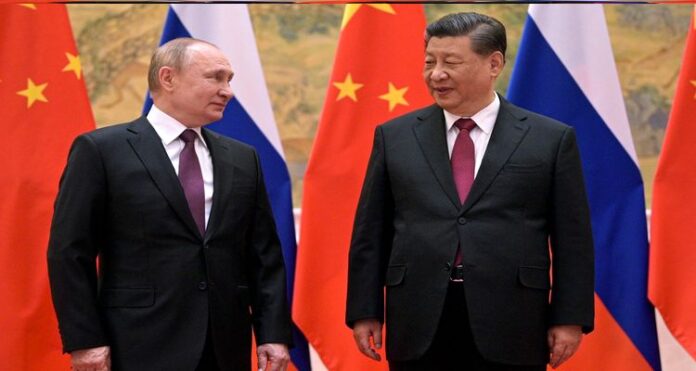| Translate This News In |
|---|
At a warm meeting in February, Chinese President Xi Jinping and Russian counterpart Vladimir Putin toasted a friendship with “no limits,” but the war in Ukraine has put that bond to the test just one month later.
With international outrage and sanctions against Russia on the rise, Beijing is scrambling to avoid being tainted by organizations with Moscow while also maintaining their increasingly close ties.
China and Russia, once bitter Cold War rivals, have grown closer than ever since Xi Jinping took power nearly 10 years ago, driven by their shared desire to challenge US power.
However, China appears to have been caught off guard by Russia’s military offensive, fierce Ukrainian opposition, and the magnitude of the resulting international anti-Kremlin backlash.
To avoid upsetting Russia, Beijing, which has long demanded territorial integrity in border disputes with its own neighbors, has been forced into rhetorical contortions on Ukraine.
While claiming national sovereignty, China has insisted that Moscow’s security concerns about Ukraine and the wider expansion of the US-led North Atlantic Treaty Organization (NATO) are valid.
It has refused to endorse Moscow, with Chinese government spokespersons chastising foreign journalists who refer to the assault on Ukraine as an “invasion” at press conferences.
– Perplexed Beijing –
At the same time, Chinese internet censors have struggled to shape domestic public discourse, initially allowing vociferous posts that tracked Beijing’s anti-US rhetoric before pivoting to scrub lewd messages objectifying women fleeing Ukraine as well as the anti-war sentiment.
“You could see the bewilderment in the early statements,” said Sergey Radchenko, a Johns Hopkins School of Advanced International Studies professor.
Failure to manage the situation skillfully risks branding Beijing as a Putin enabler, potentially alienating Western trading partners and jeopardizing the tenuous balance of links China has cultivated in recent years with both Russia and Ukraine.
According to Richard Ghiasy, an expert at the Hague Centre for Strategic Studies, the situation has effectively paralyzed China.
“Security interests virtually always trump economic interests” in China’s calculus, he said, adding that the country will not fundamentally shift toward a more pro-Ukraine stance.
According to Ghiasy, Russia is a “giant, nuclear-armed, and resource-rich neighbor” that China will not risk provoking.


















